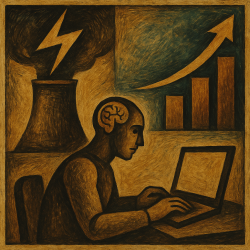|
👁️🗨️
AI

"⚡ Meta’s Nuclear Power, 🧑💻 Databricks’ AI Search, 📈 a16z’s $15B AI Fund Boost.", inspired by Karel Capek.
|
|
|
|
Hi there, this is your daily dose of AI Brief.
|
|
|
|
Today’s highlights:
⚡ Meta secures 6.6GW nuclear power for AI data centers.
🧑💻 Databricks launches Instructed Retriever for precise enterprise AI search.
🧠 Stanford builds SleepFM Clinical AI model predicting 130+ diseases.
🛡️ CyberArk reports poor enterprise IAM practices risking AI security.
🧑💻 Microsoft debuts Agent Lightning for RL without code rewrites.
📈 a16z raises $15B to back AI startups advancing US interests.
🧊 Arctic Forecast Boost, 🧩 LLM Backdoor Risks, 🧪 AI Fluid Glitches, 🔒 Cisco ISE Patch, 🤖 Nvidia AI Efficiency, 🖼️ Grok Image Limits, 🧬 Aurora Gene Editing.
|
|
|
|
Essential Brief Newsletters.
Explore More from Essential Brief
💼 Board – Stay on top of global affairs, business, and markets in 5 minutes a day.
🪙 Crypto – The fastest way to catch up with Bitcoin, DeFi, NFTs, and regulations.
👁️🗨️ AI – Daily updates on breakthroughs, tools, and industry trends.
👉 Subscribe all at Essential Brief.
|
|
The Essentials:
- Meta has secured agreements with Oklo, TerraPower, and Vistra to supply over 6.6 GW of nuclear power for its AI data centers.
- Vistra will provide 2.1 GW from existing plants, while Oklo and TerraPower will deliver SMR capacity by the early 2030s.
- These deals address grid saturation in the PJM region and test SMR cost targets amid regulatory and market uncertainties.
- Databricks introduced the Instructed Retriever, a novel retrieval architecture enhancing enterprise AI search with precise instruction-following capabilities.
- This approach surpasses traditional Retrieval Augmented Generation (RAG), boosting retrieval recall by 35-50% and improving multi-step agent performance by over 30%.
- The architecture integrates system specifications throughout retrieval and generation, enabling schema-aware, low-latency search with improved response quality and reduced task time.
- Stanford researchers developed SleepFM, a clinical AI model predicting over 130 diseases using sleep data. This innovation targets early diagnosis.
- SleepFM integrates multimodal sleep metrics, enhancing diagnostic accuracy and enabling scalable clinical applications in sleep and disease management.
- The model's broad disease scope invites regulatory review and comparison with existing AI tools, highlighting challenges in clinical adoption and validation.
- CyberArk reveals that 63% of cybersecurity leaders report employees bypass IAM controls, worsening AI security risks in enterprises.
- Only 1% of firms fully deploy just-in-time privileged access; 91% maintain always-on privileges, complicating AI and human identity controls.
- Shadow privileges and fragmented tools hinder governance; unique AI identities and automated, centralized IAM are advised to mitigate risks.
- Microsoft Research Asia introduced Agent Lightning, an open-source framework enabling reinforcement learning (RL) for AI agents without code rewrites. It separates task execution from model training, allowing RL integration with existing agents seamlessly.
- Agent Lightning employs hierarchical RL via LightningRL, assigning rewards per LLM call, compatible with single-step RL algorithms like PPO and GRPO. It improves training efficiency and scales across complex multi-agent workflows.
- Tested in Text-to-SQL, retrieval-augmented generation, and math QA, Agent Lightning enhanced accuracy and reasoning. Its modular, decoupled design supports asynchronous scaling and flexible RL customization.
- a16z has raised $15 billion to fund AI startups focused on advancing U.S. technological and strategic interests. The fund targets innovation in AI sectors.
- This capital injection aims to accelerate AI development, supporting operational growth and competitive positioning in the U.S. tech ecosystem.
- The initiative reflects broader trends in tech investment, emphasizing national priorities amid global AI competition and regulatory scrutiny.
|
|
|
|
Enjoying this newsletter?
Forward to a friend and help them stay ahead of the curve.
|
|
|
Subscribe
|
|
|
|
|
|
|
Do you want to talk? Send me a
message
|
|
You were sent this message because you subscribed to
AI Brief
unsubscribe
|
|
|
|
|
|
|